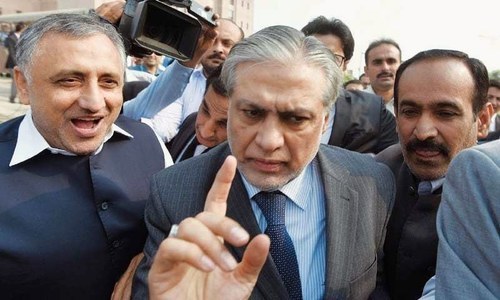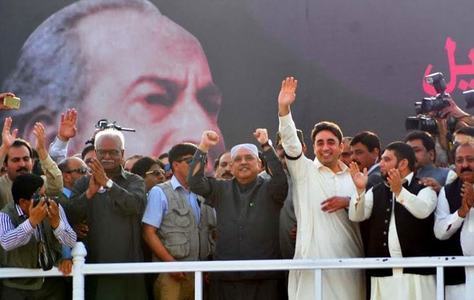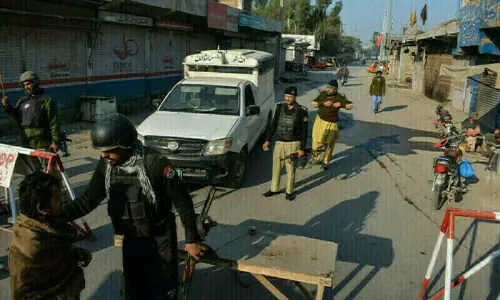ISLAMABAD: The Supreme Court is yet to decide about the fate of party tickets awarded for Senate polls by a party head if it is declared that an individual disqualified under Article 62(1)(f) of the Constitution cannot be elected a party head, observed Chief Justice Mian Saqib Nisar on Wednesday when another SC bench he was heading reserved its ruling on the question about the length of disqualification.
The validity of party tickets was discussed during the hearing of challenges to the Election Act 2017 by a three-judge bench of the apex court that ordered the Election Commission of Pakistan (ECP) to furnish copies of party tickets awarded by the Pakistan Muslim League-Nawaz, Pakistan Peoples Party and Pakistan Tehreek-i-Insaf for the upcoming Senate election.
The order was issued to ascertain if the party tickets for the March 3 election had been issued by the respective party heads under their signatures.“We have to consider what will become of the party tickets issued by the party head if tomorrow it is declared that the passage of the Election Act does not have the protection of Article 69 — a provision that protects the parliamentary proceedings — and that a disqualified individual cannot be elected as party head,” the chief justice observed.
When the counsel for the PML-N Salman Akram Raja made a reference to the 14th Amendment according to which a party head wielded unlimited power under Article 63-A of the Constitution, the bench ordered Attorney General Ashtar Ausaf to submit the entire record of the 14th Amendment to find out what discussion had taken place while passing it and in what time frame the amendment to the Constitution had been passed. The AG was also asked to inform the court who had been in power at that point of time. The 14th Amendment was passed in 1997 when Mr Sharif was the prime minister in his second stint.
Attorney general insists that parliament be allowed to determine length of disqualification as apex court reserves judgement
On Wednesday, Advocate Raja highlighted how political vacuum was created when giants like Hussain Shaheed Suhrwardy, Maulana Bhashani, Ayub Khuro and 79 others had been disqualified under the Elective Bodies Disqualification Order, 1959 (EBDO) — an ordinance introduced by former president Gen Ayub Khan. The political vacuum was filled up by other forces, which were less committed to Pakistan, he argued, adding that the court could not place an embargo upon politicians restricting them from entering the parliament because as citizens of Pakistan they had the right to association and right to speak under Article 17 and 19 of the Constitution. The counsel highlighted that the Constitution had not put any bar, disqualification or qualification to a party head.
When Justice Umar Ata Bandial asked if a drug lord with his own militia like in any banana republic be allowed to become the head of a political party, the counsel responded that this question should be left to the wisdom of the parliament and the people of the country.
Justice Ijaz-ul-Ahsan observed a party head was a pivot as the entire political party moved around him, because he controlled party members including the parliamentarians. “We are dealing with the legislators who have to legislate. Can we allow looters and robbers to become the head of a party?” questioned the judge.
The counsel, however, argued that the choice to elect the party head was that of its voters and supporters. He said there was a difference between being a party head and a parliamentary party leader. “The party head cannot direct a parliamentarian or remove any parliamentarian from the parliament, because no ultimate power has been vested in the party head in this regard,” he said. Thus the rights of parliamentarians were completely protected especially under Article 17 of the Constitution, the counsel said.
The chief justice then questioned if a person who was a shop lifter be allowed to become a party head, having a bigger responsibility with a role in country’s governance. The counsel said that the party head was a political position and the choice to elect party head was a political decision of individuals according to their perception. In this regard, he referred to Article 63-A of the Constitution that deals with the disqualification of a member on defection. “There is no question of party head issuing direction while sitting outside the parliament,” the counsel said.
Mr Raja argued that the parliamentary party devised its own functions and it was not binding on them to follow the dictates of the political parties rather they issued their own directions for the parliamentary members.
The party head, in case of any complaint about breach of discipline or defection, could refer the matter to the Election Commission of Pakistan for a decision which could then be upheld or rejected by the Supreme Court. Through the 14th Amendment, the party head could declare any member to have defected requiring the ECP to de-notify the same as the issue was related to the internal party discipline. Thus in view of the due judicial process, the impression that the Election Act had given omnipotent power to a party head was totally wrong, he argued.
But if a party head did not refer a case to the ECP, the most pivotal and utmost power remained vested with the party head, the chief justice said. He questioned again if a convict could run affairs of a party against the spirit of the Constitution, especially when an immoral person could not become a member of the parliament.
The counsel argued that the proviso to Article 5 of the Political Parties Ordinance 2002 was a particular provision added at a particular juncture of Pakistan’s history and did not articulate a constitution test against which Section 203 of the Election Act (party head) was to be measured. When the effect of disqualification or lack of qualification under Article 62(1)(f) was limited to the effect expressly provided in the Constitution about the ineligibility to get elected as member of the parliament, no other disability could be drawn out, he concluded.
Ruling on disqualification term reserved Meanwhile, a five-judge Supreme Court bench, headed by Chief Justice of Pakistan Mian Saqib Nisar, on Wednesday reserved its ruling on the question about the length of disqualification handed down under Article 62(1)(f) of the Constitution.
Article 62(1)(f) is the same provision under which former prime minister Nawaz Sharif was disqualified by a five-judge bench of the apex court, headed by Justice Asif Saeed Khosa, on July 28, 2017 in the Panama Papers case.
Appearing before the Supreme Court, Attorney General Ashtar Ausaf argued that it was not the function of courts to say that the disqualification under Article 62(1)(f) of the Constitution was for life or for a specific time period. The question should be best left for the parliament to decide, the AG said.
When asked by the court if the declaration of honesty expired on its own after some time, the country’s top law officer replied that the declaration of the court would continue till such time the parliament made some provisions.
Justice Ahsan observed that if a crime was committed, the disqualification would apply for life. However, the chief justice wondered if the time for disqualification had not been determined by parliament, would this mean the subject had been disqualified for life or not.
The AG agreed that the Article 62(1)(f) of the Constitution did not determine the length of the disqualification period, but at the same time insisted that the parliament would have to look into the matter and decide it.
Published in Dawn, February 15th, 2018


































